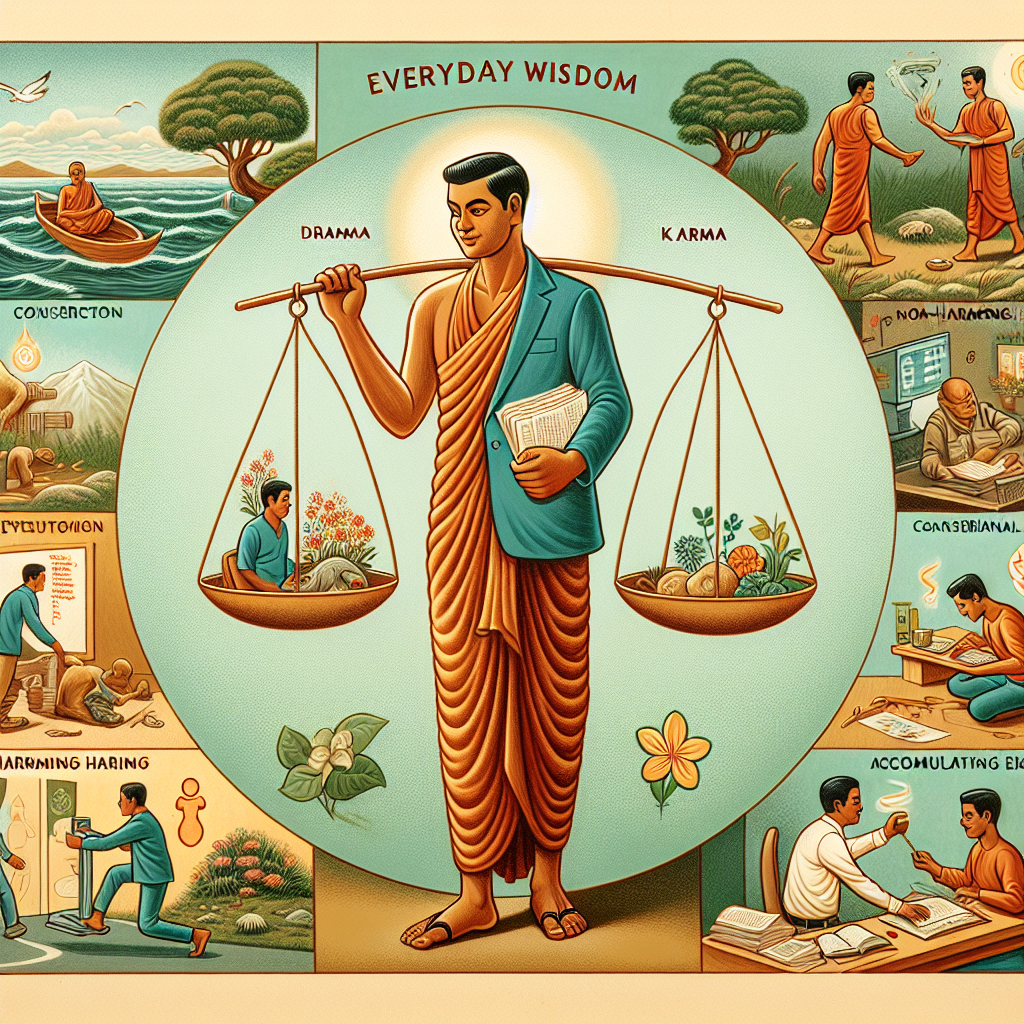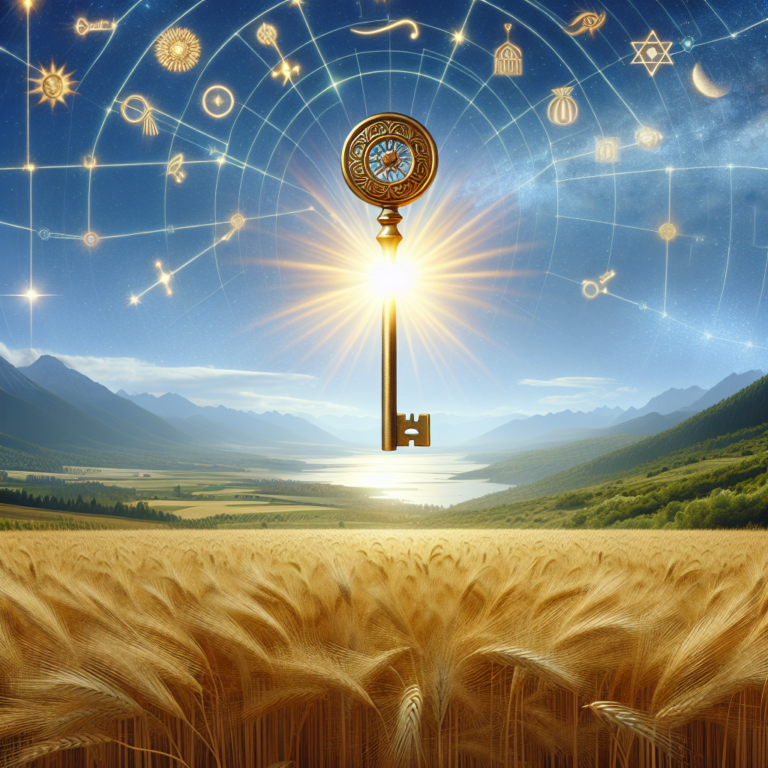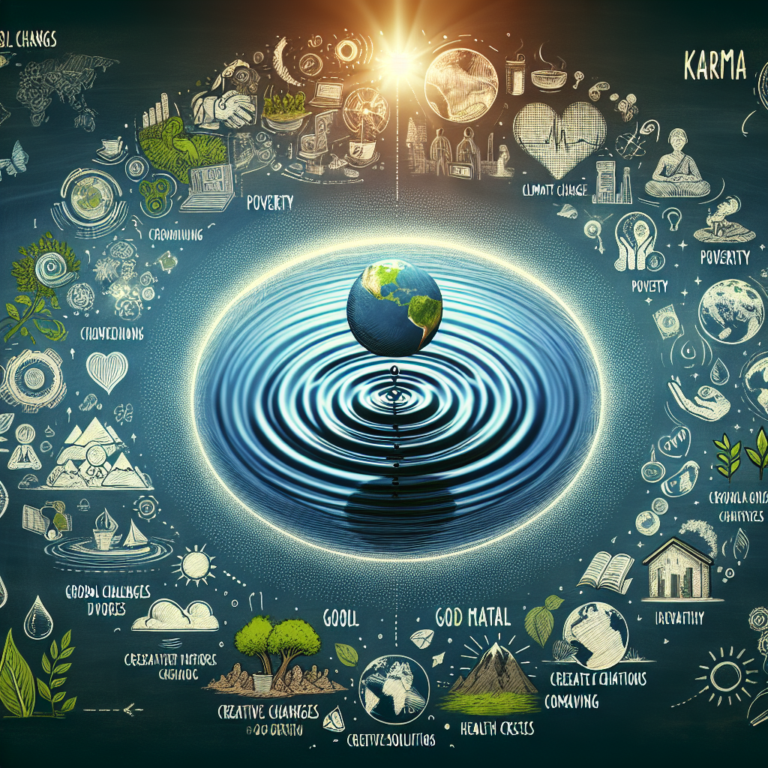The concept of Dharma is integral to several Eastern philosophies and religions, especially Hinduism and Buddhism. It is a Sanskrit term that can be translated to mean “righteousness,” “moral law,” “duty,” or “path.” Understanding Dharma is crucial to finding one’s path in everyday life, allowing individuals to align their actions and decisions with a greater purpose.
What is Dharma?
Dharma encompasses the ethical and moral principles that govern an individual’s life. It emphasizes the importance of living in accordance with one’s true nature and fulfilling one’s duties, roles, and responsibilities towards others and the universe. Dharma encourages individuals to live with integrity, compassion, and respect for all living beings.
The Origins of Dharma
The concept of Dharma has its roots in ancient Indian scriptures, including the Vedas, Upanishads, and the Bhagavad Gita. These texts provide guidance on how to live a righteous life and uphold one’s duties. In the Bhagavad Gita, for instance, Lord Krishna advises Arjuna on his Dharma as a warrior, illustrating that one’s duty should be performed without attachment to the results.
Dharma in Different Religions
While Dharma is most commonly associated with Hinduism and Buddhism, akin concepts exist in other cultures and religions. For instance, in Buddhism, the Dharma refers to the teachings of the Buddha, which guide followers on the path toward enlightenment. Similarly, in Christianity, one may interpret righteousness and duty as following God’s commandments and acting with love and compassion.
The Different Aspects of Dharma
Dharma can be understood through various lenses, including:
- Personal Dharma (Sva-Dharma): Your individual duty and responsibilities that align with your identity and circumstances.
- Universal Dharma (Samanya-Dharma): Principles that apply to everyone, such as honesty and non-violence.
- Social Dharma (Raj-Dharma): Responsibilities toward society and the collective welfare.
- Spiritual Dharma (Moksha-Dharma): The ultimate quest for self-realization and liberation.
The Importance of Understanding Your Dharma
Understanding one’s Dharma is essential for leading a fulfilling life. It provides a moral compass, guiding individuals through ethical dilemmas and helping them make choices that resonate with their core values.
1. Clarity in Decision-Making
When you clearly understand your Dharma, it becomes easier to evaluate situations and make decisions aligned with your values and responsibilities. This clarity reduces confusion and stress, leading to better outcomes in both personal and professional spheres.
2. A Sense of Purpose
Having a defined Dharma gives people a sense of purpose or calling in life. This sense can motivate individuals, providing direction and meaning to their actions and pursuits.
3. Enhanced Relationships
Aligning with one’s Dharma fosters stronger relationships as individuals learn to respect their duties towards others. It encourages compassion, empathy, and understanding, which are crucial for maintaining healthy connections.
How to Discover Your Dharma
Finding your Dharma is a personal journey that requires introspection and self-discovery. Here are some steps to guide you:
1. Self-Reflection
Take time to reflect on your values, passions, strengths, and weaknesses. Journaling can be a useful tool for this process. Ask yourself questions like:
- What are my core values?
- What activities make me feel fulfilled and happy?
- What are my natural talents?
2. Seek Guidance
Consult with mentors, spiritual teachers, or counselors who can provide guidance and support. Discussions with others can help you gain new perspectives and insights into your Dharma.
3. Experiment and Explore
Try different activities, volunteer, or take courses in topics that interest you. Exploring various fields can reveal hidden passions and inform your understanding of your Dharma.
4. Listen to Your Intuition
Your intuition is a powerful guide in discerning your Dharma. Pay attention to what feels right and resonates with your core self. This can be a strong indicator of your true path.
Living Your Dharma in Everyday Life
Once you have found your Dharma, the next step is to implement it in your daily life. Here are some strategies to help:
1. Setting Intentions
Begin each day by setting clear intentions that align with your Dharma. This practice can help you stay focused on your goals and maintain a sense of purpose throughout the day.
2. Practice Mindfulness
Incorporate mindfulness into your daily routine to stay present and aware of your thoughts and actions. Mindfulness will help you to make conscious choices that are in harmony with your Dharma.
3. Cultivate Compassion
Make an effort to practice compassion in your interactions with others. Understanding and honoring the Dharma of others will enhance your relationships and promote a sense of unity and understanding.
4. Reflect Regularly
Set aside time to reflect on your actions and experiences regularly. Assess whether you are living in accordance with your Dharma and make necessary adjustments. This practice can help you stay aligned with your true path.
Challenges in Understanding and Following Your Dharma
Despite the clarity that Dharma can provide, individuals may face challenges in understanding and following their path:
1. Societal Pressures
External expectations from family, friends, or society can create conflict with personal Dharma. It’s essential to differentiate between your own interests and those imposed by others.
2. Fear of Judgment
Fear of criticism or failure may prevent individuals from pursuing their Dharma. It’s crucial to embrace your authentic self, understanding that others’ opinions should not dictate your path.
3. Lack of Clarity
At times, individuals may feel lost or unsure about their Dharma. Engaging in self-discovery practices is essential during these periods of uncertainty.
4. Resistance to Change
Shifting from a previous path to align with one’s Dharma may be challenging. Embracing change with an open heart and mind is vital for growth.
Conclusion
Understanding Dharma is a profound journey towards self-discovery, purpose, and fulfillment. It implores individuals to reflect upon their values, duties, and the impact of their actions on themselves and others. Embracing Dharma provides clarity, direction, and a sense of belonging in a world that often feels chaotic. As we navigate through life’s myriad decisions and role changes, understanding and living our Dharma can enhance our well-being and cultivate a harmonious existence filled with purpose and meaning.
FAQs
What is Dharma in simple terms?
Dharma refers to an individual’s duty, moral responsibility, and the path one should follow to live a righteous life. It involves aligning one’s actions with ethical values and societal roles.
How can I find my Dharma?
Finding your Dharma requires self-reflection, exploring your interests and strengths, seeking guidance from mentors or spiritual teachers, and listening to your intuition.
Can Dharma change over time?
Yes, Dharma can evolve with personal growth, life experiences, and changing circumstances. Regular reflection helps individuals stay aligned with their current values and responsibilities.
How do societal expectations affect Dharma?
Societal expectations can sometimes conflict with personal Dharma. It’s essential to recognize these pressures and ensure that your actions align with your true self rather than external expectations.
Is Dharma the same as religious duty?
While Dharma can encompass religious duties, it is broader and includes moral and ethical responsibilities in every aspect of life, irrespective of religious affiliation.
https://open.ai/c6ecc7dbb98d808049330ee7650c7507 ,
It seems you might be looking for a writing prompt or a topic to explore. Here are a few options you might consider:
Alternate History: Imagine a world where electricity was never discovered. Describe how society, technology, and daily life might be different.
Character Development: Write a short story about a character who discovers a hidden talent that changes their life, but they must decide whether to embrace it or keep it a secret.
Nature and Environment: Describe a day in the life of a park ranger in a national park. What challenges do they face, and what joys do they find in their work?
Science Fiction: Create a scenario where humans have made contact with an alien species that communicates through emotions rather than words. How does this relationship develop and what challenges arise?
- Fantasy World-Building: Design a fantasy kingdom where magic is regulated by a governing body. What are the rules of magic, and how do they affect the citizens of the kingdom?
Feel free to pick any of these prompts or let me know if you have a specific topic in mind!
, #Understanding #Dharma #Finding #Path #Everyday #Life, #Understanding #Dharma #Finding #Path #Everyday #Life, 1733989456, understanding-dharma-finding-your-path-in-everyday-life




